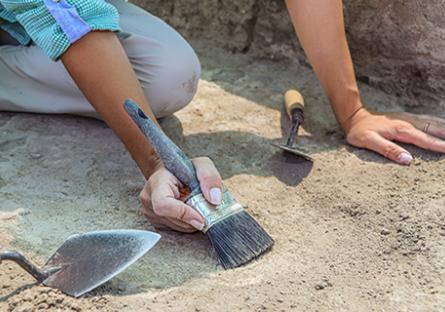
GCC Professor Dean Wheeler and MCC Professor Kirk Costion have joined forces to teach an archaeological field methods course. Students enrolled in this class (ASB 231) get instruction on excavation of an archaeological site, recording and interpreting data collected during the field experience, as well as an overview of the cultures concerned and contemporary issues in archaeology. As part of the class, students investigated a transitional early Classic period Hohokam trash mound on a small plot of undeveloped land in the Mesa Cemetery in north-central Mesa, Arizona. The site is situated on the far northeastern margins of the large residential community associated with the Sce:dagĭ Mu:val Va’aki (formerly Mesa Grande) platform mound complex. Excavations yielded a rich artifact assemblage that provided insights about domestic life in an early Classic period community. The field work is conducted in consultation with the Salt River Pima-Maricopa Indian Community Tribal Historic Preservation Office.
The findings and results of three field seasons collecting archaeological materials were recently presented by MCCCD graduates from GCC and MCC in a symposium at the Society for American Archaeology's Annual Meeting in Denver, Colorado. MCCCD students who have completed the course have found success in the field of archaeology, with many working in Cultural Resource Management throughout Arizona. Others have completed degrees or are currently enrolled at each of the state's three universities. Two students, William Dundas and Zithlaly Vega, recently gained admission to the PhD program at ASU's School of Human Evolution and Social Change. The archaeological field methods course is offered most spring semesters and is open to any MCCCD student.